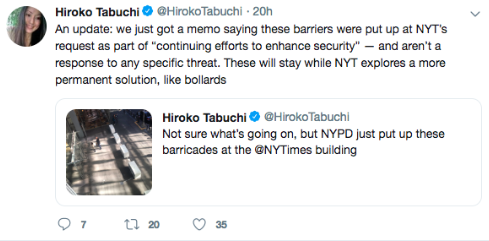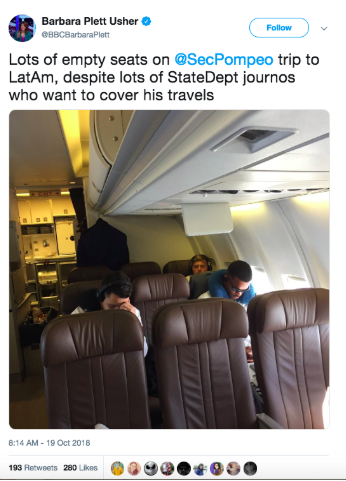US — #WeeklyAddress: October 15 - October 21: Former FBI agent receives four-year sentence for violating Espionage Act
Below are the most notable incidents regarding threats to press freedom in the US during the week of October 15 - October 21:
Former FBI agent receives four-year sentence for violating Espionage Act
Former FBI agent Terry Albury received a four-year prison sentence on October 18 after pleading guilty to two counts of violating the Espionage Act last year. Albury was accused of compromising national security by taking and leaking dozens of FBI documents to the press concerning the agency’s guidelines for using informants, surveilling journalists, and other related tactics. Although the court did not identify the news outlet to which Albury disclosed the information, many believe the charges are linked to a series of reports published by investigate reporting outlet The Intercept. Prosecutors dismissed the claim Albury’s attorneys made stating the former agent disclosed information as an objection to the FBI’s alleged abuse of authority and discriminatory surveillance practices. Albury is not the first whistleblower to be sentenced to prison for violating the Espionage Act under the Trump administration; Former NSA contractor Reality Winner was sentenced in August to more than five years in prison for leaking confidential information to the press.
Treasury Department employee arrested and charged with disclosing confidential records to reporters
A Treasury Department senior adviser was arrested and charged in a New York federal court on October 17 with disclosing to the press confidential documents related to the special counsel’s probe into Russian election interference. According to the Justice Department, starting last October Natalie Mayflower Sours Edwards had secretly provided a reporter with confidential information highlighting the financial transactions of President Donald Trump’s associates and others being investigated in the probe that may have involved illegal activity. Edwards saved documents on a flashdrive and sent images of them over an encrypted application to a reporter, according to court filings. This information has been referenced in at least 12 BuzzFeed News articles. Edwards has been officially charged with one count of unauthorized disclosures of suspicious activity reports and one count of conspiracy to make unauthorized disclosures of suspicious activity reports, both of which carry a maximum sentence of five years in prison.
President Trump praises Montana congressman for assaulting reporter at rally
At his October 18 rally, President Trump reiterated his praise for Montana Congressman Greg Gianforte for body-slamming Guardian reporter Ben Jacobs last May. President Trump positively described the incident in which Gianforte attacked Jacobs after the reporter asked a question regarding the politician’s stance on healthcare policy. “Any guy that can do a body slam—he’s my kind of guy,” the president said about the congressman, who pled guilty to misdemeanor assault last year. “He’s a great guy, tough cookie.” President Trump also said he initially feared Congressman Gianforte’s actions would ruin his chances at winning the congressional election before concluding: “‘Wait a minute, I know Montana pretty well, I think it might help him.’ And it did.” Trump’s praise of the assault is of great concern to journalists and press freedom advocates, particularly given the recent controversy surrounding missing journalist and US-resident Jamal Khashoggi, who was most likely killed by the Saudi authorities earlier this month. “To celebrate an attack on a journalist who was simply doing his job is an attack on the first amendment by someone who has taken an oath to defend it,” Guardian US editor John Mulholland said in a statement.
PEN America sues President Trump for First Amendment violations
On October 16 PEN America filed a lawsuit in federal court against President Donald Trump alleging that he has violated the First Amendment on at least four occasions by threatening to use government powers to punish his media critics. These violations, detailed in the organization’s public FAQ, include President Trump’s threats to use the Justice Department to disrupt a merger between CNN’s parent company Time Warner and AT&T because of his discontent with CNN’s coverage, and to have the federal government revoke the broadcasting licenses of television organizations that have criticized his administration. PEN America also argues speech has become “chilled” as a result of the president’s “retaliatory acts and credible threats.” In the suit, the organization has asked for a declaratory judgment, which would allow the court to rule that the president’s threats to use government power to punish speech violate the First Amendment. It also asks for the court to issue an injunction to stop the president from directing government agencies to retaliate against journalists.
New York Times requests security barriers outside headquarters
The New York Police Department installed barriers outside the New York Times headquarters on October 17 “as part of continuing efforts to enhance security,” according to a tweet Times reporter Hiroko Tabuchi published the same day. These barriers, she wrote, “aren’t a response to any specific threat.”

This isn’t the first instance in which the Times has enhanced security. The outlet, alongside many other news media organizations, increased security on the day of the Capital Gazette shooting in June. Other major organizations have also experienced security scares, including The Boston Globe, which received several death threats related to the op-ed campaign its editors led in August.
Journalists highlight limited press access on Secretary of State’s flight
Journalists have recently drawn attention to the limited number of reporters attending the State Secretary’s trip to Latin America on October 19. NPR Diplomatic Correspondent Michele Kelemen retweeted an image showing several empty seats on State Secretary Mike Pompeo’s flight, noting, “There were rarely free seats on trips I took during the Bush and Obama administrations. But this administration limits the number of reporters on board.” The Trump administration has received criticism for limiting press pools’ access to members of the administration, including during official travel.

The United States ranks 45th out of 180 countries in RSF's 2018 World Press Freedom Index after falling 2 places in the last year.
For the latest updates, follow RSF on twitter @RSF_en.



